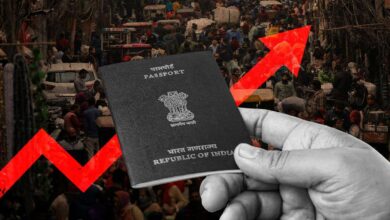E-Commerce Giants Are Crushing Small Retailers. Are Samsung and Xiaomi Secretly Destroying Competition in India?
Companies like Samsung, Xiaomi, Amazon, and Flipkart have been accused of serious allegations of violation of antitrust by Indian smartphone markets. These companies have launched products simply on the platforms of e-commerce without fair competition which hurts these small retailers. During its probe, the Competition Commission of India discovered the companies that were entering into agreements so as to offer some sellers preferential treatment, hence creating an uneven playing field in the market due to an unfair advantage by a few at the cost of others.

India is home to one of the biggest and fastest-growing markets for smartphones worldwide, valued at billions of dollars in sales every year. However, allegations made by the Competition Commission of India in recent times suggest that this buoyant market has been far from being treated on a level playing field.
E-commerce giants Amazon and Flipkart, as well as the likes of smartphone makers Samsung, Xiaomi, Realme, and Motorola, have all been accused of being anti-competitive by releasing handsets only on these platforms and bypassing smaller retailers to disrupt the play in the market.
Reports accessed by Reuters say the CCI, in its thorough inquiries, has come up with voluminous reports stating such practices as violative of India’s antitrust laws. This article will go deeper into the issue at hand: considering the nature of the exclusive launch deals, their impact on the Indian market, legal frameworks, and potential consequences the companies involved may face.
The Role of E-Commerce and Smartphone Sales in India
India boasts one of the world’s biggest markets of smartphone users, with over 600 million as of 2023. Amid these vast numbers, many international and local smartphone manufacturers have been attracted to this potential market to try to capture the new demand for low-priced and high-tech devices.
E-commerce has also expanded at an explosive pace, of course, with the help of platforms such as Amazon and Flipkart. Online shopping has turned out to become the first choice of the many, indeed even after the COVID-19 pandemic, that expanded the shift towards digital purchasing. As per Bain & Company, e-commerce business in India is likely to reach above $160 billion by 2028 compared to the current projection of around $57-60 billion in 2023.
In this scenario, several smartphone makers have opted to place their products exclusively online directly through e-commerce platforms like Amazon and Flipkart. Such exclusive launches benefit both the e-commerce sites and smartphone companies. However, the deals have also been criticized, as they potentially threaten consumer choices and minuscule retailers based on physical sales.
In this context, several smartphone makers have opted to place their products exclusively online directly through e-commerce platforms like Amazon and Flipkart. Such an exclusive launch has offered benefits to both the e-commerce platform and the smartphone company. However, the deals have also been criticized as they potentially threaten consumer choices and minuscule retailers based on physical sales.
Allegations- Collusion Between Smartphone Makers and E-Commerce Platforms
The CCI investigation, based on complaints by Confederation of All India Traders (CAIT), revealed that such companies as Samsung, Xiaomi, Realme, and Motorola agreed to exclusive launch arrangements with e-commerce players Amazon and Flipkart. These deals ensured that new smartphone models could be sold only by e-commerce players for a considerable period of time. Meanwhile, other brick-and-mortar store retailers were barred from selling the products, especially the smaller ones of which they lost sales as competition in the market reduced.
As per the 1,027-page CCI report against Amazon and its group companies and a 1,696-page report against Flipkart, both online sellers favored listings from handpicked sellers, granted deep discounts for first-time launches, and utilized foreign investments to avail cutthroat deals for services like warehousing and marketing. The practices of these two companies violated local competition laws including unfair market dominance and restrictive trade practices.
Important Findings from the CCI Reports
1. The CCI noted that the companies such as Samsung, Xiaomi, Motorola, Realme, and OnePlus had tied up with both Amazon and Flipkart to offer their mobile handsets as exclusive launches on their platforms. This limited the market for other retailers who could not access the products and thus, did not receive a fair share in the same.
2. E-commerce websites new to the scene favoured certain vendors and gave them monopoly rights to sell the latest smart phones. They were also given discounted warehouse and marketing charges, thus offering them lower prices than those of the small retailers.
3. The CCI reports demonstrated how these exclusive launches disfavoured the small brick-and-mortar stores. The new smartphone models did not reach these retailers, and thus a loss of customers who bought newer models online. There were cases where these stores received new models, accompanied by a shift in demand and subsequent loss.
4. The reports also indicated that such practices harmed consumers because their options were limited. Since there were fewer shops to buy the new version of the smartphone, consumers had no other option other than buying from Amazon or Flipkart, making them have reduced competition and possibly a higher price or service quality by other sellers.
The Role of Samsung and Xiaomi

Samsung and Xiaomi are two of the biggest smartphone manufacturers in India, together holding approximately 36% of the market, according to Counterpoint Research. Along with Vivo, which holds a 19% share, these companies dominate the Indian smartphone market. Their involvement in the exclusive launch deals with Amazon and Flipkart has drawn significant attention due to their market power.
Samsung’s Involvement
Samsung is one of the most prominent electronics manufacturing companies in the world, founded by a South Korean. It has an impressive presence in India with devices available across various segments of the smartphone market, from budget-friendly to premium models. According to the CCI report, Samsung had also adopted the practice of exclusive arrangements with Amazon and Flipkart. It released its new smartphones exclusively on these two platforms, which only made the practice anticompetitive as identified during the investigation.
Xiaomi’s Involvement
In recent years, Chinese smartphone major Xiaomi quickly gained significant market share in India. Using feature-loaded devices, Xiaomi sold millions of units at affordable prices. According to the findings of CCI, it primarily relies on the online sales channel, especially on Flipkart. According to the report by CCI, the dominance of Xiaomi in the online market for the sale of smartphones was partially due to its use of the exclusive launch of devices along with Flipkart, which was contrary to the interest of smaller retailers.
The CCI has asked these companies, including OnePlus, Realme, and Motorola, to submit their audited balance sheets for the last three fiscal years. This is an inquisition that will analyze the financial implication brought on by the exclusive deals of launch and identify whether such practices provided undue benefits to the participating companies.
Multiple Impacts on Small Retailers
Perhaps the most troubling aspect that the CCI inquiry brings to light deals with the stranglehold that these exclusive launch deals place on smaller retailers. Classic, local, brick-and-mortar stores, many family-owned, require consistent availability of new products in order to attract customers, but the exclusive launch deals pretty much shut the doors on them for weeks or months.
Few medium and small retailers have long complained of their treatment, saying that these policies make it uneven. Meanwhile, Amazon and Flipkart can sell the latest models of smartphones at lower prices, which doesn’t happen when small shops sell. With its 80 million small retailers in its fold, Confederation of All India Traders has been vocal about its criticism of these offers. Over the years, the body has managed to file multiple complaints with the CCI.
New smartphones reach small retail much later after they are released initially. If a product is online-exclusive, then it takes weeks for the same to reach an offline store. This means that by the time retailers obtain the products, most of the initial demand from consumers would already have been met through sales at online stores. This hurts the sales opportunities for small retailers while further eroding their customer bases because customers gradually become accustomed to ordering online.
Another major reason is that this online commerce site can sell the smartphones at prices so low and this also occurs due to the discounts offered by the producers and the reduced services of Amazon and Flipkart that cuts down the operational strength of the smaller retailers as they are not offered the same facilities and therefore, cannot be in a position to compete at the same price, hence their strength was further decreasing.
Legal Structure- Competition Act of 2002
Indian antitrust legislation is governed by the Competition Act of 2002, which prohibits agreements adverse to competition or likely to cause an appreciable adverse effect on the market. The Act must be read in the light of enforcing fair competition and preventing abusive dominant positions by firms.
Section 3 of the Competition Act prohibits an agreement where it is likely or causes an appreciable adverse effect on competition. Both horizontal agreements between competitors and vertical agreements between firms at different levels of the supply chain such as manufacturers and distributors would fall under this section.
The launch deals of such nature between smartphone companies and e-commerce platforms would be vertical because these restrict the sale of new smartphones to Amazon and Flipkart. Hence, they would eventually decrease the availability of that particular product to other retailers, thus causing harm to the market competition.
The Competition Act under Section 4 prohibits companies from abusing the dominant market position. Under this investigation, the CCI is considering whether Amazon and Flipkart, which have become the dominant players in the e-commerce market, abused the position by entering into exclusive deals with smartphone manufacturers thus limiting competition and even consumer choice.
Role of CCI and Powers in Investigation
The Competition Commission of India is the selfsame statutory body responsible for enforcing the provisions and consequences of the Competition Act. The commission would have wide-ranging powers to investigate potential violations of antitrust laws, including the ability to impose fines and mandate changes in business practices.
Investigation Process
It was kickstarted in 2020 through a complaint lodged by an associate of Confederation of All India Traders against Amazon, Flipkart, and smartphone manufacturers in a CCI investigation. Since then till date, the CCI has put the businesses under heavy scrutiny, scrutinizing data points on product launches, pricing strategy, and sales trends. These over 2,700 pages combined reports of the CCI expose this inquiry and depict the anticompetitive conduct observed.
Potential Penalties
If the CCI does really endorse its findings, then it can impose serious penalties in the form of fines on the companies. The CCI can impose fines according to the global revenues of the companies; thus, penalties will be huge for major companies working globally like Amazon, Samsung, and Xiaomi. Apart from that, the CCI also aims for a compulsory change in business practice so that those companies would have to stop doing an exclusive launch contract or treat all retailers with equal aspects related to their products.
Implications of the Case for Amazon, Flipkart, and Smartphone Manufacturers

The case against Amazon, Flipkart, and the other relevant smartphone manufacturers is a threat to them. Companies, if found guilty by the CCI in this case, will be liable not only in India but even abroad under relevant laws with all attendant legal and financial fallouts.
But beyond the financial penalties, perhaps the main adjustment on the business practice would be that the companies would have to align their business practices and systems with Indian competition law. This might limit some exclusivity launch agreements with retailers, where all distributors could access the same products, or alter the pricing structure companies use so that they cannot undercut smaller competitors. All these changes might significantly affect the capacity of the companies to competitively play in the Indian market, most adversely for Amazon and Flipkart.
Reputational Damage
The implications of such antitrust violation allegations could further dent the reputation of the companies concerned beyond India and onto the international plane. Consumers and investors may view the actions of the companies as somehow unfair or unethical, leading swiftly to a loss of confidence and thus a decline in sales. The spillover effect of this investigation into Samsung and Xiaomi and other multinational corporations, therefore, is a reality that can spill into other countries around the world where such companies are doing business.
The consequences of the CCI investigation also spillover into the whole Indian smartphone market. If the companies are forced to end exclusive launch deals, then it would create a field-level playing ground for small retailers and stimulate more competition in the market, thereby allowing consumers to have more options and better prices, among other things.
The CCI probe only serves to throw further light on the increasing tension brewing between online and offline retail in India. Brick-and-mortar businesses are increasingly incapable of competing with the ease, pricing, and product options provided by the online platforms as e-commerce grows. The case for a more holistic balance of competition in retail is well made by allegations of antitrust in the smartphone market.
Despite the CCI investigation, e-commerce in India is likely to sustain rapid growth. Bain & Company envisages that the Indian e-retail market would touch an all-time high of more than $160 billion by 2028, with increased internet penetration, rapidly growing consumer incomes, and increased love for shopping online. This growth is likely to sustain for companies like Amazon and Flipkart but probably will have to change their business practice to conform to competition law.
In doing so, it could include change in favor of smaller retailers, especially the ones in the offline markets, and, eventually, change at the hands of CCI that would, directly enough, affect the retailers with respect to current exclusive launch deals against fair competition.
The allegations of antitrust violations made by Samsung, Xiaomi, Amazon, Flipkart, and other smartphone manufacturers have drawn attention to intricately complex and often opaque relationships existing between e-commerce platforms and manufacturers in India. The CCI’s probe found that this pattern of exclusive launch agreements, preferential dealing, and pricing strategies have been harming smaller retailers and reducing competition in the market.
Companies stand to get fined to a gigantic sum and litigation challenges and corporate practice overhaul with this ongoing investigation. Thus, this case would have its implications on the Indian smartphone market, e-commerce in the future, and the balance between the online and offline retailers.
The takeaway from the case, therefore, is that stiffer competition laws, when implemented, are crucial to a fair and competitive market. India needs to ensure its still-burgeoning digital economy benefits from not locking out any player from competing and then innovating their way to success.




